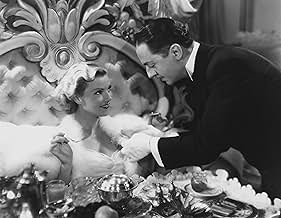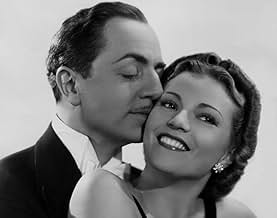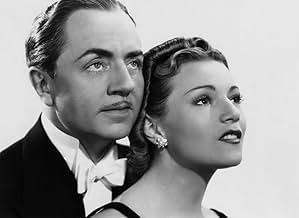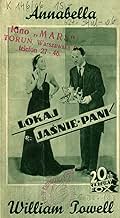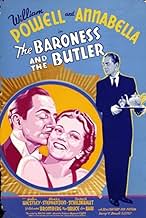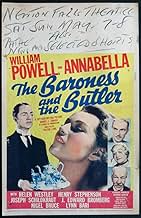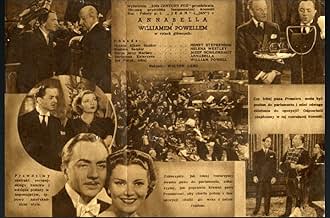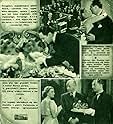Un mayordomo es elegido al parlamento húngaro donde se opone al gobierno de su amo.Un mayordomo es elegido al parlamento húngaro donde se opone al gobierno de su amo.Un mayordomo es elegido al parlamento húngaro donde se opone al gobierno de su amo.
- Dirección
- Guionistas
- Elenco
- Premios
- 2 premios ganados en total
Ivan F. Simpson
- Count Dormo
- (as Ivan Simpson)
Sidney Bracey
- Member of Parliament
- (as Sidney Bracy)
Opiniones destacadas
10CKohls
It is rare that I come upon a classic film I like this much. Comedy, drama, a charming story, all well produced and satisfying. I am not a fan of screwball comedies or slapstick, and a lot of times that's what people think of when they think of classic comedy, which is a shame. Much of the comedy in this film could be used today. William Powell is brilliant as ever. Annabella is stunning. Henry Stephenson is charming. He reminds me of a friendly C. Aubrey Smith. And they were in fact cast together in Little Lord Fountleroy (which, if you haven't seen, is an excellent forgotten classic). I can't recommend this film highly enough. Someone has uploaded it to youtube recently, which is where I watched it.
... OR "Mr. Godfrey Goes to Budapest". So, yes, it's a pretty obvious rework of "My Man Godfrey" from 1936. But then "The Star of Midnight" and "The Ex Mrs. Bradford" were reworkings of "The Thin Man" formula and they worked.
Johan Porok (William Powell) is a third generation head butler to Count Sandor (Henry Stephenson) and his family. The count praises him for his dedication to "all of the ancient arts" of being a perfect servant. Count Sandor is prime minister of Hungary, so he is naturally interested in the outcome of the parliamentary elections. To his surprise, his butler Johan has been elected to a seat in parliament. Here is my first problem. How could Sandor's own butler be running for parliament and the prime minister not be aware?
Johan ran on the progressive ticket, and the count is a member of the conservative party, so they are at odds politically speaking. And Johan quickly rises to be a leader in his party, largely by regularly skewering his employer's performance in office. Sandor doesn't mind this, but his daughter the titular baroness (Annabella), does seem to mind a great deal. Here's some more weirdness to ponder. The baroness is married to the Baron Georg Marissey (Joseph Schildkraut), but routinely sleeps in her old room at her parents' house. She is apparently somewhat estranged from the baron although not truly separated. With Schildkraut in the part of the baron, one can only assume it is because he is some kind of slimy little weasel - Schildkraut excelled at such roles - but the source of her initial antipathy is never really revealed.
The title and having watched "My Man Godfrey" will somewhat give the outcome away, but how this happens within the bounds of the production code is something you will have to watch and find out yourself. Besides what I already mentioned, there was just something off about this production. For one thing, Annabella's accent makes her almost incomprehensible at times. I also never feel any authenticity in the Baroness' positive feelings towards Johan.
It was fun watching Powell play a politician for a change, though. He is quite the socialist in this production. He advocates redistributing farmland to the peasants - Hey Johan who exactly is going to have to "donate" this land in your scheme? - and he also advocates a reduction in armaments. If Johan recognized the winds of war that were in the air in Europe in1938, perhaps he would want to hold on to those armaments.
I'd say this film is probably a 6.5 rather than a 6 or a 7/10 if I was permitted a score with more granularity.
Johan Porok (William Powell) is a third generation head butler to Count Sandor (Henry Stephenson) and his family. The count praises him for his dedication to "all of the ancient arts" of being a perfect servant. Count Sandor is prime minister of Hungary, so he is naturally interested in the outcome of the parliamentary elections. To his surprise, his butler Johan has been elected to a seat in parliament. Here is my first problem. How could Sandor's own butler be running for parliament and the prime minister not be aware?
Johan ran on the progressive ticket, and the count is a member of the conservative party, so they are at odds politically speaking. And Johan quickly rises to be a leader in his party, largely by regularly skewering his employer's performance in office. Sandor doesn't mind this, but his daughter the titular baroness (Annabella), does seem to mind a great deal. Here's some more weirdness to ponder. The baroness is married to the Baron Georg Marissey (Joseph Schildkraut), but routinely sleeps in her old room at her parents' house. She is apparently somewhat estranged from the baron although not truly separated. With Schildkraut in the part of the baron, one can only assume it is because he is some kind of slimy little weasel - Schildkraut excelled at such roles - but the source of her initial antipathy is never really revealed.
The title and having watched "My Man Godfrey" will somewhat give the outcome away, but how this happens within the bounds of the production code is something you will have to watch and find out yourself. Besides what I already mentioned, there was just something off about this production. For one thing, Annabella's accent makes her almost incomprehensible at times. I also never feel any authenticity in the Baroness' positive feelings towards Johan.
It was fun watching Powell play a politician for a change, though. He is quite the socialist in this production. He advocates redistributing farmland to the peasants - Hey Johan who exactly is going to have to "donate" this land in your scheme? - and he also advocates a reduction in armaments. If Johan recognized the winds of war that were in the air in Europe in1938, perhaps he would want to hold on to those armaments.
I'd say this film is probably a 6.5 rather than a 6 or a 7/10 if I was permitted a score with more granularity.
This is a fine film in the small category of butler and maid comedies. In most such films, a leading character assumes the identity of a butler for any number of reasons, with madcap comedy resulting. But, "The Baroness and the Butler" is different in that the butler here is a bona fide servant of the Hungarian prime minister. And, he's proud to be the head of the household staff, having followed in the footsteps of his father and ancestors before him. Small injections of satire occur here and there, especially with some subtle pokes at the aristocracy and politics of the period and place.
William Powell plays Johann Porok in the lead role. This is his second time as a butler - having played a wealthy Bostonian in disguise in "My Man Godfrey" of 1936. But, here Powell is a loyal servant who runs a perfect household for Count Albert Sandor and his family. Henry Stephenson plays the count who also happens to be the prime minister, as head of the ruling political party in Hungary.
The film has a talented cast that includes Annabella, the French star who was making her American film debut. She plays Baroness Katrina Marissey, daughter of the Count and Countess Sandor (played by Helen Westley). She is married to Baron Georg Marissey, who is played by Joseph Schildkraut. Nigel Bruce has a nice role as a pompous and bumbling Major Andros.
Porok is so well liked by the count and countess and their family, that he's almost one of the family. Well, not quite, because he's still not of their class. But they fret that Johann has no prospects of marriage, because they want his progeny to continue in the service to their family.
That's the setting when things begin to unravel as Johann wins a seat in parliament in the opposition party. He will continue to work as a devoted servant for the count, but in the parliament he is the leader of the forces that seek to wrest control of the country. Johann's speeches point to the ineptitude of the count and his party. All of this provides a fine mix of light drama and light comedy.
The best part is the relationship between Johann and the baroness. Her demeanor gradually changes from one of indignation at the thought of Johann's rise in status, to one of admiration. And, of course, love has been blooming underneath all of this. The count's role is one of an affable gentleman who admires Johann as well for his political enterprise.
The film has a nice outcome for all. It doesn't have the hilarity of the butler and maid films with mishaps and antics. But, even with a less frivolous setting and plot, this film has some very good humor and fun. It makes a nice addition to a small library of butler and maid comedy films. Here are some favorite lines.
Johann Porok, "This is the last day of parliamentary elections. Those of you who have not voted will be given time to do so today. That is all."
Klari, "Don't you ever get off your high horse and have fun?" Johann Porok, "Klari, don't let your imagination run away with you."
Count Albert Sandor, "Johann, will you kindly break my neck?" Johann Porok, "With pleasure, your excellency."
Baroness Katrina Marissey, "I'm giving a ball." Countess Sandor, "A ball? Oh, you poor child. Do we have to come?"
Baroness Katrina Marissey, "Would you like a smoke?" Johann Porok, "Thank you." Looking at the cigarette he has just taken from the box offered by the baroness, he continues, "Abdulla, with the rose leaf." Baroness, "Mother brought them back for me." Johann, "Yes, I know. I smuggled them across the border in my trunk." Baroness, "Oh."
William Powell plays Johann Porok in the lead role. This is his second time as a butler - having played a wealthy Bostonian in disguise in "My Man Godfrey" of 1936. But, here Powell is a loyal servant who runs a perfect household for Count Albert Sandor and his family. Henry Stephenson plays the count who also happens to be the prime minister, as head of the ruling political party in Hungary.
The film has a talented cast that includes Annabella, the French star who was making her American film debut. She plays Baroness Katrina Marissey, daughter of the Count and Countess Sandor (played by Helen Westley). She is married to Baron Georg Marissey, who is played by Joseph Schildkraut. Nigel Bruce has a nice role as a pompous and bumbling Major Andros.
Porok is so well liked by the count and countess and their family, that he's almost one of the family. Well, not quite, because he's still not of their class. But they fret that Johann has no prospects of marriage, because they want his progeny to continue in the service to their family.
That's the setting when things begin to unravel as Johann wins a seat in parliament in the opposition party. He will continue to work as a devoted servant for the count, but in the parliament he is the leader of the forces that seek to wrest control of the country. Johann's speeches point to the ineptitude of the count and his party. All of this provides a fine mix of light drama and light comedy.
The best part is the relationship between Johann and the baroness. Her demeanor gradually changes from one of indignation at the thought of Johann's rise in status, to one of admiration. And, of course, love has been blooming underneath all of this. The count's role is one of an affable gentleman who admires Johann as well for his political enterprise.
The film has a nice outcome for all. It doesn't have the hilarity of the butler and maid films with mishaps and antics. But, even with a less frivolous setting and plot, this film has some very good humor and fun. It makes a nice addition to a small library of butler and maid comedy films. Here are some favorite lines.
Johann Porok, "This is the last day of parliamentary elections. Those of you who have not voted will be given time to do so today. That is all."
Klari, "Don't you ever get off your high horse and have fun?" Johann Porok, "Klari, don't let your imagination run away with you."
Count Albert Sandor, "Johann, will you kindly break my neck?" Johann Porok, "With pleasure, your excellency."
Baroness Katrina Marissey, "I'm giving a ball." Countess Sandor, "A ball? Oh, you poor child. Do we have to come?"
Baroness Katrina Marissey, "Would you like a smoke?" Johann Porok, "Thank you." Looking at the cigarette he has just taken from the box offered by the baroness, he continues, "Abdulla, with the rose leaf." Baroness, "Mother brought them back for me." Johann, "Yes, I know. I smuggled them across the border in my trunk." Baroness, "Oh."
"The Baroness and the Butler" is a 1938 film starring William Powell and the French star signed by 20th Century Fox, Annabella, who got the big star buildup from Fox. Little did Darryl F. Zanuck know that she was more interested in matters of the heart than career. When she met and fell in love with Tyrone Power on her next film, "Suez," Zanuck tried to get rid of her by offering her films in Europe. She refused to leave Power (and who could blame her) and the two married, becoming the Brangelina of their era. Zanuck blacklisted her, and there went the star buildup and the big film career.
This is a charming film set in Hungary, about a butler, Johann Porok (Powell) who works for the Prime Minister (Henry Stephenson). The prime minister and his family, particularly his daughter Katrina (Annabella) are shocked when Johann is elected to Parliament - by the opposition party. What's more, he wants to stay on as butler. Meanwhile, Katrina's philandering husband (Josef Schildkraut) has a few political ambitions of his own.
Powell does a smooth job in this film as the elegant butler who is known for his brilliant speeches in Parliament. Stephenson is great as his amused boss, and Schildkraut, who played so many slimeballs, is terrific as usual. Annabella was a wonderful actress, and when her film career took a nosedive thanks to Zanuck, she and Power did radio shows together. Annabella also had a great success on Broadway, did "Liliom" with her husband in Westport Connecticut, and worked tirelessly for the war effort before returning to France when she and Power divorced.
"The Baroness and the Butler" isn't a great film, but it has good performances and a breeziness about it. Enjoyable if predictable.
This is a charming film set in Hungary, about a butler, Johann Porok (Powell) who works for the Prime Minister (Henry Stephenson). The prime minister and his family, particularly his daughter Katrina (Annabella) are shocked when Johann is elected to Parliament - by the opposition party. What's more, he wants to stay on as butler. Meanwhile, Katrina's philandering husband (Josef Schildkraut) has a few political ambitions of his own.
Powell does a smooth job in this film as the elegant butler who is known for his brilliant speeches in Parliament. Stephenson is great as his amused boss, and Schildkraut, who played so many slimeballs, is terrific as usual. Annabella was a wonderful actress, and when her film career took a nosedive thanks to Zanuck, she and Power did radio shows together. Annabella also had a great success on Broadway, did "Liliom" with her husband in Westport Connecticut, and worked tirelessly for the war effort before returning to France when she and Power divorced.
"The Baroness and the Butler" isn't a great film, but it has good performances and a breeziness about it. Enjoyable if predictable.
An amusing little story that probably worked better on the stage and doesn't appear to have been much of a challenge for any of the cast. Powell fans will enjoy it nonetheless and Anabella is quite stunning, despite her thick accent. More of Nigel Bruce in comedy relief might have helped the film along.
Although 20th Century Fox touted this as a debut film for French star Anabella, her filmography includes two earlier American films for the same studio. A note on the Fox Movie Channel stated that production on The Baroness and the Butler was delayed while Powell mourned for Jean Harlow, who was engaged to him at the time of her death.
Although 20th Century Fox touted this as a debut film for French star Anabella, her filmography includes two earlier American films for the same studio. A note on the Fox Movie Channel stated that production on The Baroness and the Butler was delayed while Powell mourned for Jean Harlow, who was engaged to him at the time of her death.
¿Sabías que…?
- TriviaThe film was rejected by the censors in Quebec, Canada while the Romanian censors removed all references to Hungary.
- ErroresEarly in the film, Powell's character can be seen using a tea trolley with a large map of and coat of arms prominently displayed on its back. Both represent Australia, not Hungary, where the film is set.
- Citas
Johann Porok: My congratulations sir.
Count Albert Sandor: For what?
Johann Porok: Your triumph.
Count Albert Sandor: Oh - that. You'd think at my age I'd have sense enough to get out of politics instead of wasting all my time with a lot of nincompoops and parasites.
- ConexionesReferenced in Hollywood Hist-o-Rama: William Powell (1961)
- Bandas sonorasTales From the Vienna Woods Op. 325
(1868) (uncredited)
Written by Johann Strauss
In the score for the opening scenes
Selecciones populares
Inicia sesión para calificar y agrega a la lista de videos para obtener recomendaciones personalizadas
- How long is The Baroness and the Butler?Con tecnología de Alexa
Detalles
- Fecha de lanzamiento
- País de origen
- Idioma
- También se conoce como
- Baronica in njen sluga
- Locaciones de filmación
- Budapest, Hungría(Stock Footage)
- Productora
- Ver más créditos de la compañía en IMDbPro
- Tiempo de ejecución
- 1h 20min(80 min)
- Color
- Relación de aspecto
- 1.37 : 1
Contribuir a esta página
Sugiere una edición o agrega el contenido que falta

